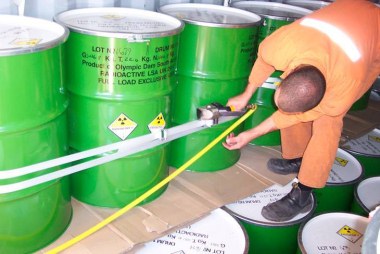The International Atomic Energy Agency (IAEA) has set an ambitious target of reducing delays and denials of shipment of radioactive material to "an insignificant level" by 2013. The IAEA board of governors, which concluded its meeting in Vienna last week, urged states to provide resources to meet this goal.
 |
| Drums of uranium oxide are packed into a shipping container |
This affects not only uranium and nuclear fuel materials but also medical supplies and several other types of goods.
This committee, which includes representatives from IAEA member states, international authorities and industry associations, has over the last three years developed a number of tools, and a structure for expediting the movement of radioactive materials.
During the meeting of the steering committee in Vienna, it was acknowledged that the IAEA's Program of Action on Cancer Therapy (PACT), designed to enable developing countries to introduce, expand or improve radiotherapy, is being hampered by the difficulty in shipping cobalt-60 sources to where they are needed. An important IAEA program to repatriate potentially dangerous sources from unstable parts of the world is also being adversely affected.
One of the central actions of the steering committee has been creation of a network of 'focal points', responsible for addressing delay and denial in a particular country. To date, over 70 countries have appointed such a focal point. The committee has also overseen the creation of a database for information on difficulties encountered during the shipment of radioactive materials. Recent analysis of the data shows that the most affected types of radioactive material are cobalt-60 and tantalite, while the most problematic mode is maritime.
According to the World Nuclear Association, delay and denial of shipment continues to affect the shipment of fuel cycle materials, although there has been a slight easing of the problem in the last year. The easing has come about thanks to economic circumstances forcing shipping lines and ports to reconsider their policies of not accepting radioactive materials.
Researched and written
by World Nuclear News






_15863.jpg)







